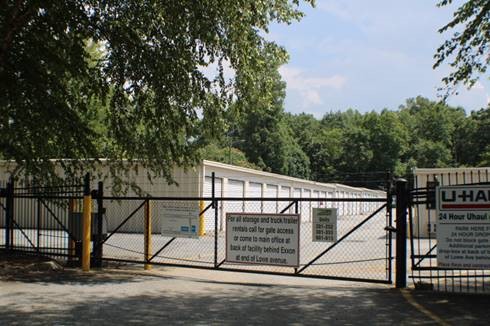Local storage units can be perfect for storing your RV safely in winter
Local storage units in Kannapolis NC can help you store your recreational vehicle (RV) safely this winter. As winter approaches in North Carolina, RV owners face the challenge of finding suitable storage solutions for their vehicles. While the winters in the state might not be as harsh as in some other regions, it’s still crucial to take proper precautions to protect your RV from the elements. One popular option is outside parking, and in this two-part series, we will explore all you need to know about safely parking your RV outdoors during the winter months.
Understanding North Carolina Winters
Before delving into the specifics of outside parking, it’s essential to have a clear understanding of what to expect during North Carolina winters. The state generally experiences milder winter temperatures compared to northern regions, with average lows rarely dipping below freezing. However, occasional cold snaps and precipitation, including rain and light snow, can still pose challenges for RV owners.
Benefits of Outside Parking
Outside parking for your RV in North Carolina comes with several advantages, especially considering the relatively mild winter conditions. Here are some key benefits:
- Cost-Effectiveness: Indoor storage facilities often come with higher price tags. Opting for outside parking can be a more budget-friendly choice, allowing you to allocate resources for other aspects of RV maintenance.
- Accessibility: Having your RV parked outdoors provides easy access whenever you want to take it for a spin or embark on an impromptu adventure. You won’t be constrained by the operating hours or restrictions of a storage facility.
- Ventilation: Proper ventilation is crucial for preventing mold and mildew growth inside your RV. Outdoor parking allows for natural airflow, reducing the risk of moisture-related issues.
- Space: RV storage facilities may have limited space, especially during peak seasons. Opting for outdoor parking gives you the flexibility to choose the location and ensures you won’t encounter capacity issues.
Preparation is Key
While outside parking offers advantages, it’s essential to take proactive measures to protect your RV from potential winter hazards. Here are some key preparations:
- Invest in a Quality RV Cover: A durable, weather-resistant cover can shield your RV from rain, snow, and UV rays. Ensure that the cover is properly fitted to provide maximum protection.
- Check Seals and Seams: Inspect all seams, seals, and joints for signs of wear or damage. Properly sealed seams prevent water infiltration, keeping the interior of your RV dry.
- Winterize Your RV: Even in milder climates, it’s advisable to winterize your RV. This includes draining water from tanks, pipes, and appliances to prevent freezing damage. Use RV antifreeze to protect plumbing systems.
- Elevate the RV: Consider parking your RV on leveling blocks to keep it slightly elevated. This helps prevent moisture buildup underneath and provides better stability.
Maintenance Routines for Outdoor RV Storage:
1. Regular Inspections:
Conduct frequent visual inspections of your RV, paying close attention to the exterior. Look for any signs of wear, damage, or potential issues. Catching problems early can prevent more extensive damage.
2. Tire Care:
Check the tire pressure regularly, as fluctuations in temperature can affect it. Under-inflated tires can lead to uneven wear and reduced fuel efficiency. Additionally, consider using tire covers to protect against UV rays and prevent dry rot.
3. Battery Maintenance:
Cold temperatures can take a toll on your RV’s battery. Keep it charged by either disconnecting it or using a trickle charger. This ensures that your RV will be ready to hit the road when you’re ready for your next adventure.
4. Interior Preparations:
Although your RV is parked outside, it’s essential to prepare the interior. Remove any perishable items, clean thoroughly, and open cabinets and drawers to promote airflow and prevent musty odors.
5. Rodent Prevention:
Winter is a prime time for rodents seeking shelter. Seal any openings where rodents could enter, and consider placing rodent repellent around the RV. Inspect the interior regularly for signs of infestation.
Additional Precautions for Outdoor RV Storage:
1. Choose the Right Location:
When selecting a parking spot, choose a level area to prevent water from pooling and potentially causing damage. Avoid parking under trees to reduce the risk of falling branches and sap.
2. Be Mindful of Surroundings:
Check the surroundings for potential hazards. Avoid parking near areas prone to flooding or in low-lying areas where water may accumulate during heavy rains.
3. Monitor Weather Forecasts:
Stay informed about upcoming weather conditions. If extreme weather is predicted, consider relocating your RV temporarily or taking extra precautions, such as removing snow accumulation from the roof.
4. Implement Security Measures:
Even in storage, security is crucial. Invest in wheel locks, hitch locks, and consider installing a security system to deter theft and unauthorized access.
5. Documentation and Insurance:
Before winterizing and parking your RV, document its condition with photographs. Review your insurance policy to ensure it provides adequate coverage during the storage period.
By incorporating these maintenance routines and precautions, you can confidently park your RV outdoors during the winter months in North Carolina. In the next and final part of our series, we’ll discuss the importance of periodic checks and offer a comprehensive checklist to ensure your RV is ready for your next adventure when the warmer weather returns. Stay tuned for valuable insights into maintaining your RV in optimal condition.
Rent the best local storage units in Kannapolis NC
Mr. Storage is locally owned and managed with affordable pricing. We have storage facilities in Concord, Salisbury, Harrisburg, Kannapolis NC, and Midland. Contact us today to reserve your unit.

